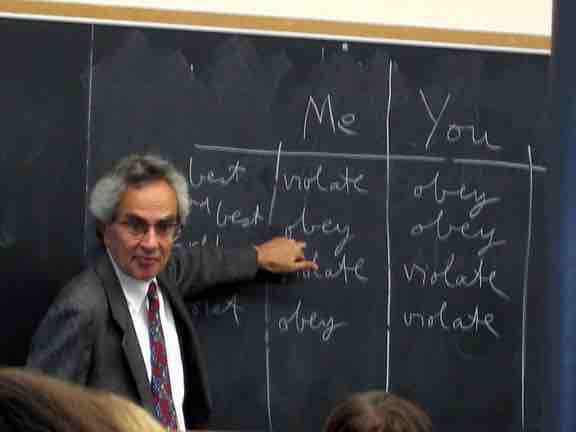Why Study Ethics?

Ethics
American philosopher Thomas Nagel teaching an undergraduate course in ethics at New York University.
What is Ethics?
When you think of ethics, what comes to mind? Perhaps you think of words and phrases like ethical behavior, professional ethics, ethics boards, or code of ethics. At its heart, ethics refers to the concept of having morally acceptable values and behaviors. When you align your behaviors and actions with these values, you engage in ethical behavior.
Ethical Behavior in Public Speaking
Why would you need to even consider ethics in public speaking? First and foremost, your audience not only needs to believe in your words and message, but they need to trust you as the message giver. To engage in unethical behavior when speaking only erodes that trust.
There are other reasons to engage in ethical behavior in public speaking:
- To maintain your credibility and reputation.
- To present a fair and accurate argument of your thesis.
- To provide honest facts with integrity and without deception or distortion.
- To abide by shared or common moral values and beliefs.
To speak ethically is to use your own original speech content. If you use any substantiating facts or passages from another, you must give appropriate attribution or credit as necessary. Ethical speakers are ones who do not plagiarize their material or try to pass off words and ideas from others as their own.
Ethical speakers do not deceive their audience. It can also be stated that ethical speakers do not distort or warp facts, or worse yet, disguise opinions as fact in order to argue their thesis or make their point.
Acknowledging and responding to conflicts of interest is also regarded as ethical public speaking behavior. There may be times where you may be asked to speak on behalf of a certain topic in which you have a professional interest or may benefit from financially. In those instances, the ethical speaker will either excuse him or herself from speaking. If unable to do so, he or she may simply disclose the nature of the conflict of interest so that everyone is on the same page.
The study of ethics, then, is incredibly important to any student of public speaking, as the most effective public speakers are those who practice ethical behavior in their speeches.